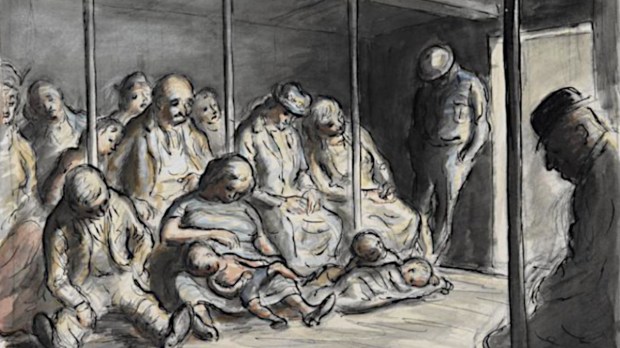Caryll Houselander is currently enjoying growing popularity as a spiritual writer, particularly because of her book The Reed of God.Published in 1944, it is rapidly ascending to the reputation of being a spiritual classic. The book is a meditative series of reflections about the Blessed Virgin Mary which, in part, focuses on Mary as Mother.
The Reed of God is spiritually thoughtful but not overtly intellectual (she actually holds to the same view that I describe in my book – that poetic knowledge and beauty are the most complete revelation of reality). Perhaps this is why it’s so popular. It’s rare to find spiritual books that are so deeply insightful but also relevant and encouraging to modern-day parents.
Houselander herself was never a biological mother. Rather, she was known as a quirky, chain-smoking, woman who possessed a great depth of humor about how odd she must have seemed to all who met her. She once claimed, “I truly believe that the best way to benefit humanity is to make faces in the bus – slightly mad faces, or puttings out of the tongue suddenly at the person opposite. Think of the thrill that gives to countless uneventful lives to whom nothing ever happens! Then they can tell everyone for weeks that they saw a mad woman on the bus…”
This is a woman with a unique perspective.
Spiritual motherhood
She brings her eccentric insight to devotion to Mary as Mother. The Reed of God, written in England during a dark time in world history when the skies above London were filled with warplanes, death, and destruction, somehow manages to make space for maternal peace. Houselander is a writer with a gift for poetic insight, very clearly a woman with a calling to be the spiritual mother to many.
This is why, as a father of six young children, I return to her writing again and again for encouragement. Her insights on parenting are refreshing when my fatherhood feels like a weary burden. I know it’s shocking to admit that parenting can be experienced as wearisome, but let’s be honest, every parent struggles sometimes. This doesn’t mean that parents who feel this way are failures. It simply means we’re human.
For me, I question my ability as a father when my ideal, abstract conception of parenting confronts a real, actual child. It’s easy to make-believe myself as the patriarch of a loving brood of handsome children. In my imagination, the boys are mature and kind. They have side parts in their pomaded hair, stand up straight, and wear suits and ties. They hold the door open for their sisters and hug their mother. The girls have flowers in their hair and dote on their poor old father. They bake me cookies and bring me my slippers and a book when I arrive home at night.
My children are some of these things some of the time. Most of the time, though, they’re far more normal. They’re real children.
“I truly believe that the best way to benefit humanity is to make faces in the bus…”
Like all other children, my kids throw fits at bedtime. They poke each other in the backseat of the van. They cry in the middle of the night. We have to remind the boys to take showers and use soap so they don’t become feral cavemen. The kitchen floor is decorated with a scattering of random, dirty, smelly shoes. Our toddler makes no secret of the fact that she prefers her mother to me.
This is when parenting becomes real. It isn’t simply a daydream. Parents are privileged to bring each individual child into the world, a new little person with a unique personality; a person who develops individual thoughts and motivations and sometimes is at odds with what I, as a father, desire. That’s when I have to dig deep. I have to be a father. Not the idea of a father – a flesh and blood father, responsive to my flesh and blood child.
Houselander, the mystical visionary
Houselander offers valuable insight, revealing a mystical vision she had while on an underground train in London. It was rush hour and every manner of person was headed home from work. Houselander observed them, just ordinary people, like any other day. Then everything changed:
Quite suddenly, I saw…Christ in them all. But I saw more than that; not only was Christ in every one of them, living in them, dying in them, rejoicing in them, sorrowing in them – but because he was in them, and because they were here, the whole world was here in this underground train, not only the world as it was at that moment, not only at the people in the countries of the world, but all those yet to come. I came out into the street and walked for a long time in the crowds. It was the same here, on every side, in every passerby – Christ.
In The Reed of God, Houselander applies the same insight to parenting children. “Christ is in our own family,” she writes, “it is He whom we foster in our children.” When I love my child, even when I don’t feel like it or it seems to be a thankless task, I love not only my specific child (the one who just carved her name into the top of our dining room table), but I also love Christ in my child.
Houselander continues, “When you play a game with your little son … you play a game with the Christ Child.” I will always remember this statement when I play the tenth game of Uno in a row with my daughter. It may be boring, but it’s the Lord’s work (and actually, with the right attitude, it isn’t even all that boring).
Seeing Christ in the boredom and the mess
I’m learning to look for Christ not only in the best moments or the ideal dream of my children. I’m looking for him the way Houselander looked at people on the subway. Each child a child of God, exactly as they are, for better or worse. I look for Christ in the messy kitchen, during the long, drawn-out bedtime process, while waiting for my son to finally locate and put on shoes even though we’re already fifteen minutes late.
When one of my children makes me angry, annoyed, or impatient, I still experience those negative feelings deeply. They still affect my behavior most of the time. I’m far from perfect. But sometimes, every once in a while, I manage to take a deep breath and recognize in my child that irreplaceable spark, that burning fire within each human soul kindled in the image of the Living God.
At that moment, I recall how eccentric Houselander was, how she appreciated all sorts of different people, and I can’t help but be grateful for the precious little souls God has granted me the privilege to share a life with under my roof. It’s an invitation to Christ himself to stay with us.



